government
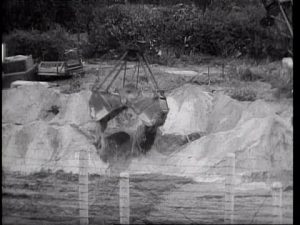 Imagine living in a country where you could only go places and do things that the government allowed you to. Communist countries are that way, but in East Berlin things had taken a much more sinister turn. Throughout the 1950s and into the early 1960s, thousands of people from East Berlin crossed over into West Berlin to reunite with families and escape communist repression. The Soviet Union had rejected East Germany’s original request to build the wall in 1953, but with defections through West Berlin reaching 1,000 people a day by the summer of 1961, Soviet leader Nikita Khrushchev finally relented. The residents of Berlin awoke on the morning of August 13, 1961, to find barbed wire fencing had been installed on the border between the city’s east and west sections. Days later, East Germany began to fortify the barrier with concrete. Construction began on August 12, 1961. The Berlin Wall was actually two walls. The 27 mile portion of the barrier separating Berlin into east and west consisted of two concrete walls between which was a “death strip” up to 160 yards wide that contained hundreds of watchtowers, miles of anti-vehicle trenches, guard dog runs, floodlights and trip-wire machine guns. Overnight, people who had family on the other side of Berlin were no longer able to see them. There was no recourse, and no warning. At first people could see their loved ones across the fence, but when the walls went up that ended too.
Imagine living in a country where you could only go places and do things that the government allowed you to. Communist countries are that way, but in East Berlin things had taken a much more sinister turn. Throughout the 1950s and into the early 1960s, thousands of people from East Berlin crossed over into West Berlin to reunite with families and escape communist repression. The Soviet Union had rejected East Germany’s original request to build the wall in 1953, but with defections through West Berlin reaching 1,000 people a day by the summer of 1961, Soviet leader Nikita Khrushchev finally relented. The residents of Berlin awoke on the morning of August 13, 1961, to find barbed wire fencing had been installed on the border between the city’s east and west sections. Days later, East Germany began to fortify the barrier with concrete. Construction began on August 12, 1961. The Berlin Wall was actually two walls. The 27 mile portion of the barrier separating Berlin into east and west consisted of two concrete walls between which was a “death strip” up to 160 yards wide that contained hundreds of watchtowers, miles of anti-vehicle trenches, guard dog runs, floodlights and trip-wire machine guns. Overnight, people who had family on the other side of Berlin were no longer able to see them. There was no recourse, and no warning. At first people could see their loved ones across the fence, but when the walls went up that ended too.
For almost 2½ years those on one side of the wall were lost to those on the other side of the wall. What the Communist regime didn’t anticipate was the fact that people would still find a way to escape. There were 39 deaths at the Berlin Wall between 1961 and 1963, and a total of 139 between 1961 and the wall’s demolition in 1989. That might not seem like so many, but when you take into account the fact that the people inside East Berlin were so closely watched, that it was almost impossible to get to supplies they needed to plan and carry out their escape attempt. Nevertheless, some people did make it safely across. No one knows for sure exactly how many people reached the western part, but some estimates claim that 5,000 East Germans reached West Berlin via the Wall. Men, women and children snuck through checkpoints, hid in vehicles and tunneled under 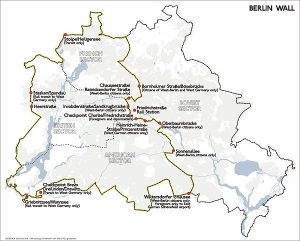 the concrete. They used hot air balloons, diverted the train, crossed the river on an air mattress, by swimming, and even by zip line and tight rope. These people really wanted their freedom.
the concrete. They used hot air balloons, diverted the train, crossed the river on an air mattress, by swimming, and even by zip line and tight rope. These people really wanted their freedom.
Finally, on December 20th through 26th or 1963, the Communist regime decided that if they issued 1 day passes to those in West Berlin, maybe it would stop the escape attempts. The East Berliners were not allowed to leave, but the West Berliners could come in and see friends and family members. I can only imagine how the people from West Berlin felt. They wanted to go and see their friends and family, but would they be allowed back out, or was this just a trap? Nevertheless, it was Christmastime, and it had been so long since they had seen them. So, nearly 4,000 West Berliners crossed into East Berlin to visit their relatives. It was all part of an agreement reached between East and West Berlin, over 170,000 passes were eventually issued to West Berlin citizens, each pass allowing a one day visit to communist East Berlin for the Christmas (Passierscheinregelung) season that year.
The day was one filled with moments of poignancy and propaganda. Tears, laughter, and other outpourings of emotions characterized the reunions that took place as mothers and fathers, sons and daughters met again. They were so happy, if only for a short time. Cold War tensions were mixed in too, however. Loudspeakers in East Berlin inundated visitors with the news that they were now in “the capital of the German Democratic Republic,” a political division that most West Germans refused to accept. Visitors were also given a brochure that explained that the wall was built to “protect our borders against the hostile attacks of the imperialists.” They were told of how the decadent western culture, including “Western movies” and “gangster stories,” were flooding into East Germany before the wall sealed off such dangerous trends, and that made it “necessary” to build the wall. West Berlin newspapers berated the visitors for being “pawns” of East German propaganda. Editorials argued that the communists would use these visits to gain West German acceptance of a permanent division of Germany. The visits, and the high-powered rhetoric that surrounded them, reminded everyone that the Cold  War involved very human, often quite heated, emotions. East Berlin allowed these similar and very limited arrangements in 1964, 1965 and 1966. In 1971, with the Four Power Agreement on Berlin, agreements were finally reached to allow West Berliners to apply for visas to enter East Berlin and East Germany regularly, however, East German authorities could still refuse to honor the entry permits. Finally in 1989, at President Ronald Reagan’s insistence, the Berlin Wall came down, and this inhumane treatment of the East German people ended.
War involved very human, often quite heated, emotions. East Berlin allowed these similar and very limited arrangements in 1964, 1965 and 1966. In 1971, with the Four Power Agreement on Berlin, agreements were finally reached to allow West Berliners to apply for visas to enter East Berlin and East Germany regularly, however, East German authorities could still refuse to honor the entry permits. Finally in 1989, at President Ronald Reagan’s insistence, the Berlin Wall came down, and this inhumane treatment of the East German people ended.
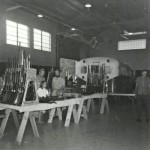
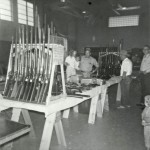 For as long as I can remember, my Uncle Bill Spencer was a gun dealer. He went to gun shows, had every kind of gun imaginable, and every accessory for them. Uncle Bill is a patriot, and he hated anything that remotely resembled an infringement on our Constitutional rights…especially the 2nd Amendment. Not only did he sell guns, but he talked to people about the importance of fighting for our Constitutional rights. That’s not surprising really, my dad, aunts, and uncles on both sides of my family, grew up in a time when America was strong and people understood what it took to keep it that way. Of course, there are still patriots today, but there are also far too many Americans who have forgotten the reason behind our freedoms. And that government should not be allowed to infringe upon those rights.
For as long as I can remember, my Uncle Bill Spencer was a gun dealer. He went to gun shows, had every kind of gun imaginable, and every accessory for them. Uncle Bill is a patriot, and he hated anything that remotely resembled an infringement on our Constitutional rights…especially the 2nd Amendment. Not only did he sell guns, but he talked to people about the importance of fighting for our Constitutional rights. That’s not surprising really, my dad, aunts, and uncles on both sides of my family, grew up in a time when America was strong and people understood what it took to keep it that way. Of course, there are still patriots today, but there are also far too many Americans who have forgotten the reason behind our freedoms. And that government should not be allowed to infringe upon those rights.
My Uncle Bill, and my dad, Allen Spencer, who was two years younger than his brother, were around guns and dynamite most of their lives. The dynamite shocked me when I first heard about it, but after they finished their story, it all made sense. For anyone who has ever tried to get rid of a tree stump, dynamite makes sense at some point. However, these boys were just a little bit crazy with their dynamite antics, from sinking the gate post while their mom was in town and then fixing it before she got home, to blowing up dynamite to celebrate the fourth of July, I don’t think their mom ever knew what to expect from them. Nevertheless, they were both safety conscious too…even as kids. They knew what could happen if you weren’t safe.
One time my dad heard that Uncle Bill was going to be in Rapid City for a gun show. Dad had been growing a beard for a centennial, and so didn’t look exactly like himself. We showed up at the gun show without telling him we were coming. Mom and Dad sent us girls ahead to just look around Uncle Bill’s table. Dad’s plan 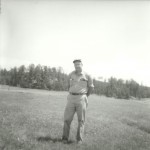
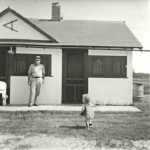 worked. When Uncle Bill finally realized who we were, he was both pleased and stunned. It was such a great prank to pull on him, and he was totally fooled. Then we had a wonderful visit with him afterward. Uncle Bill has always been so special to me, and I missed him a lot. I think we had a lot in common. Our interests run along the same lines, and that made our visits special, and our partings tough. I’m thankful that we still have Uncle Bill in our lives, but I wish we could see him more often. Today is Uncle Bill’s 94th birthday. Happy birthday Uncle Bill!! Have a great day!! We love you!!
worked. When Uncle Bill finally realized who we were, he was both pleased and stunned. It was such a great prank to pull on him, and he was totally fooled. Then we had a wonderful visit with him afterward. Uncle Bill has always been so special to me, and I missed him a lot. I think we had a lot in common. Our interests run along the same lines, and that made our visits special, and our partings tough. I’m thankful that we still have Uncle Bill in our lives, but I wish we could see him more often. Today is Uncle Bill’s 94th birthday. Happy birthday Uncle Bill!! Have a great day!! We love you!!
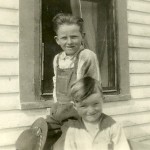 Opinions vary on the matter of child labor, and who can legally have their child work and at what kind of job. Some people take it to the point of saying that children shouldn’t even do chores around the home, which is, in my opinion, silly. It is my thought that children need to be helping out around the house, but beyond that I suppose the water gets a little bit murky. In the distant past, children were farmed out to spend their days working at a job that should have been done by an adult, and the kids really had no childhood to speak of. That is cruel treatment, and the current child labor laws prevent that from happening…unless people are so illegal that they do it without the knowledge of the government.
Opinions vary on the matter of child labor, and who can legally have their child work and at what kind of job. Some people take it to the point of saying that children shouldn’t even do chores around the home, which is, in my opinion, silly. It is my thought that children need to be helping out around the house, but beyond that I suppose the water gets a little bit murky. In the distant past, children were farmed out to spend their days working at a job that should have been done by an adult, and the kids really had no childhood to speak of. That is cruel treatment, and the current child labor laws prevent that from happening…unless people are so illegal that they do it without the knowledge of the government.
That said, there is a group of kids…even today that do work every day, and it is not illegal at all. These are the children of farmers and ranchers. I don’t know of any of those kids who don’t help out around the farm or ranch. There are stables to be cleaned, and cows to be milked, and animals to feed. There are also crops to be cared for and planted. These kids work and there is nothing illegal about it. Of course, their parents do have to 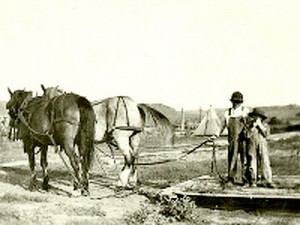 be careful on a few matters. The children must get their schooling, and they have to be working on the parents farm or ranch.
be careful on a few matters. The children must get their schooling, and they have to be working on the parents farm or ranch.
Such was the case for my husband’s great uncles and his grandfather. Many people owned farms when those boys were young, and the kids helped out with just about everything. Most families back then really couldn’t afford to hire the amount of workers that it would take to run the place, so they hired what they had to, and the kids learned to work. I really can’t say that I think this is a bad thing. The kids often like the work…especially taking care of horses…since they often get to ride them too.
If you look back on the lives of our parents and grandparents, you will find that many of them grew up on a farm or ranch, and most of them were working to help out on the place at a very young age. Really, what a wonderful way to bond with the parents. Running a ranch or farm is a big job, and most kids like to do the things their parents are doing, because they want to be just like their parents. If a child is interested in doing the same kind of work their parents do, or take over the family farm, they need to know how to do this from the bottom up. What better way could there be, than to help out as a child.
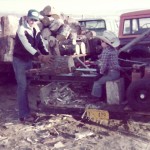
Of course, not every family owns a farm or ranch, and while they may live in the country, they don’t have that kind of work to do. Still, the kids can and should help out with things. My nephew, Barry Schulenberg, loved helping his grandpa split firewood. He ran the splitter while his grandpa loaded the wood into it. Barry was about 4 years old, but you couldn’t have pulled him away from that job for anything. He was the one who did that, and that was all there was to it. Maybe some people would think he was a bit young, but there was never a single accident when he worked the splitter. I think sometimes we don’t give these kids enough credt. They can often do more than we think they can. They just need to be given a chance.
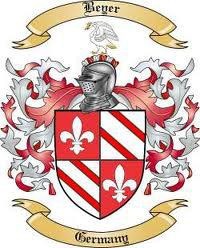 In the middle of the 18th century, Germany was a country that had been floundering due to European politics for more than a hundred years. At that time, France, England, and Spain largely had control of the continent because of their military might. The German states, on the other hand, were left to their own devices, and each leader was running his state for his own gain, without concern for the people or the nation as a whole. As a result of all the political greed, Germany was a nation that was going to quickly go under or eventually succumb to the greed around it and become an evil dictatorship, and no help was coming. It was in this Germany, at this time in history that my 6th Great Grandfather, Philipp Beyer (a name that would later be Americanized to Byer) and his wife, my 6th Great Grandmother Maria, were a young couple with a small son…my 5th Great Grandfather, Johann Beyer.
In the middle of the 18th century, Germany was a country that had been floundering due to European politics for more than a hundred years. At that time, France, England, and Spain largely had control of the continent because of their military might. The German states, on the other hand, were left to their own devices, and each leader was running his state for his own gain, without concern for the people or the nation as a whole. As a result of all the political greed, Germany was a nation that was going to quickly go under or eventually succumb to the greed around it and become an evil dictatorship, and no help was coming. It was in this Germany, at this time in history that my 6th Great Grandfather, Philipp Beyer (a name that would later be Americanized to Byer) and his wife, my 6th Great Grandmother Maria, were a young couple with a small son…my 5th Great Grandfather, Johann Beyer.
Germany was quickly becoming a place that was either going to fall apart or be controlled 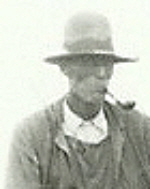 by it’s own evil leaders. Either way, Germany had become a place where my 6th Great Grandparents could no longer afford to raise their family, so they made the decision to immigrate to Russia, which at that time in history was a better choice. I can’t even imagine how they must have felt, as they were leaving the country they loved, and moving to an unknown situation in an unknown country. Russia must have ended up being a good decision, because the family would live there for the next five generations, before my Great Grandfather, Cornelius George Byer, would make the decision in 1874 to immigrate to America, once again in search of a better life and to get away from a government that was quickly becoming extremely evil.
by it’s own evil leaders. Either way, Germany had become a place where my 6th Great Grandparents could no longer afford to raise their family, so they made the decision to immigrate to Russia, which at that time in history was a better choice. I can’t even imagine how they must have felt, as they were leaving the country they loved, and moving to an unknown situation in an unknown country. Russia must have ended up being a good decision, because the family would live there for the next five generations, before my Great Grandfather, Cornelius George Byer, would make the decision in 1874 to immigrate to America, once again in search of a better life and to get away from a government that was quickly becoming extremely evil.
It is a sad thing when a government becomes so evil that you feel like you must immigrate to another country in order to save your children from the tyranny of your own country. Like it or not, that is what many people had to do and still have to do in order to protect 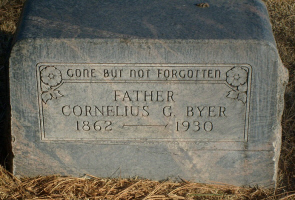 their children. The move to America would be the best thing my great grandfather ever did. Once here, they were able to get a homestead that belonged to them, and was not subject to confiscation by an evil government, and more importantly, their children could not be taken away by the government to be raised as it saw fit, and become as evil as it was. It does make me very thankful that my grandfathers were wise enough to know when it was time to simply cut your losses, and get out…before their evil government made it impossible to leave.
their children. The move to America would be the best thing my great grandfather ever did. Once here, they were able to get a homestead that belonged to them, and was not subject to confiscation by an evil government, and more importantly, their children could not be taken away by the government to be raised as it saw fit, and become as evil as it was. It does make me very thankful that my grandfathers were wise enough to know when it was time to simply cut your losses, and get out…before their evil government made it impossible to leave.

